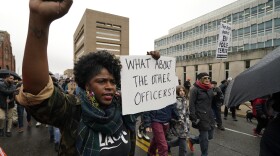NOAH ADAMS, host:
Doctors have become targets in drug violence in the Mexican border city of Tijuana. In the last few months, 20 have been kidnapped. Mexico's president, Felipe Calderon, has sent hundreds of federal police and soldiers to Tijuana.
But as Amy Isackson reports now from member station KPPS in San Diego, doctors say more must be done to end the violence.
AMY ISACKSON: Dozens of doctors in Tijuana recently cancelled their morning rounds. Instead, they gathered on the steps at the city's General Hospital. Dressed in their starch white coats, they demanded government officials to stop the violence.
Unidentified Woman #1: They are incompetent.
ISACKSON: Like all the doctors at this protest, this physician was afraid to give her name. But she didn't hold back in expressing her contempt for officials' attempts to crack down.
Unidentified Woman #2: The governor just laughs and says, hey, take a course: karate course or something, because the kidnappers will keep on being. We are tired of being afraid to go out in the streets, tired of being afraid to go to the restaurants because we get mugged. We are tired of having family members and friends and everybody get kidnapped and murdered sometimes, even if you pay the money. So I think this has to stop.
ISACKSON: Doctors aren't just afraid to go out on the streets, they're also afraid to go to work. Last spring, drug cartel gunmen shot their way into the emergency room at Tijuana's General Hospital to rescue a wounded comrade.
(Soundbite of shooting, commotion)
ISACKSON: Patients and doctors, like this gynecologist, ran for their lives.
Unidentified Woman #3: (Through translator) When we saw how they shot up the emergency room without caring that women, children and sick people where in there, that's when we realized the magnitude of the danger we were in, that we could die.
ISACKSON: Drug cartels have increasingly turned to kidnapping to make more money. It appears doctors have become one of their favorite targets. People think doctors are wealthy; they're well known in the community. Their pictures and addresses are in the yellow pages. But it wasn't until a prominent Tijuana surgeon was kidnapped last month that doctors were galvanized to exhort the government to crack down, despite doctors' pleas and government official's vows to redouble their efforts to fight crime. David Shirk, who directs the University of San Diego's TransBorder Institute, says violence is still out of control.
Mr. DAVID SHIRK (University of San Diego): It may take a much larger deployment of force in Tijuana to actually be effective. In Metrocon they sent more than double the number of troops they sent to Baja California. They don't have, really, any other choice but to use the big guns.
ISACKSON: Tijuana physiologist David Sotelo says the guns and the troops already in Tijuana, combined with the daily violence, are taking a toll on people. He says his patients are exhibiting the same traumatic symptoms people exhibit during war.
Dr. DAVID SOTELO (Physiologist): People are in the middle of bullets and uncertainty. If you go to Iraq right now, what do they do? They will do work and they run back home. That's what they're doing in Tijuana.
ISACKSON: Sotelo says he's recently had to go back and study up on post-traumatic stress and anxiety disorders to care for his clients. It's not just adults who are feeling the effects of the violence. Back on the General Hospital steps, this gynecologist, who escaped the shootout here last year, says now her 7-year-old daughter is feeling it too.
Unidentified Woman #4: (Trough translator): I was astonished the other day when my daughter told me that she and her little friends are practicing escape drills at recess in case gunmen come to the elementary school. Instead of thinking about playing their thinking about where they'll hide.
ISACKSON: She says she and her colleagues are on tender-hooks as well.
Unidentified Woman #4: (Through translator) We know at any moment they can bring us injured drug traffickers. And they can just come in impunity like they've done before. We're living in constant anguish.
ISACKSON: The government has promised to come up with new strategies to combat the rising violence. In the meantime, Baja California's secretary of health announced this week the state will go to special operating room at the penitentiary to treat suspected drug cartel members injured in shootouts.
For NPR News, I'm Amy Isackson in San Diego. Transcript provided by NPR, Copyright NPR.



